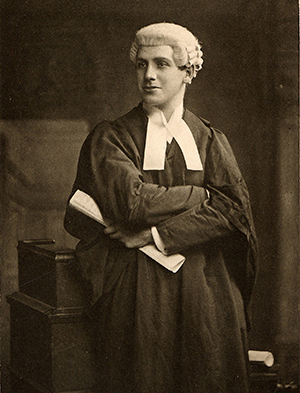COUNTDOWN TO 2016: Emmet Dalton and Tom Kettle at the Battle of the Somme
Published in Issue 4 (July/August 2016), Reviews, Volume 24By Joseph E.A. Connell Jr

Above: Tom Kettle. Shortly before his death he sent his wife a sonnet that he wrote for their daughter, Barbara. Its lines expressed the disillusionment of many Irish nationalists fighting in the trenches:
In wiser days, my darling rosebud, blown
To beauty proud as was your Mother’s prime.
In that desired, delayed incredible time,
You’ll ask why I abandoned you, my own,
And the dear heart that was your baby throne,
To dice with death. And oh! they’ll give you rhyme
And reason: some will call it the thing sublime,
And some decry it in a knowing tone.
So here, while the mad guns curse overhead,
And tired men sigh with mud for couch and floor,
Know that we fools, now with the foolish dead,
Died not for Flag nor King nor Emperor,
But for a dream born in a herdsman’s shed,
And for the secret scriptures of the poor.
A member of Dublin’s middle class, Tom Kettle joined the Irish Volunteers at their inception in 1913. Previously, he had been a Home Ruler and described it thus: ‘Home Rule is the art of minding your own business well. Unionism is the art of minding someone else’s business badly.’ Later, in 1914, the Volunteers sent Kettle on an arms-raising mission to the Continent, where he witnessed the outbreak of the First World War: ‘The outbreak of war caught me in Belgium, where I was running arms for the National Volunteers’, and on 6 August 1914 he wrote from Brussels that it was a war of ‘civilisation against barbarians’.
Kettle returned to Dublin and sided with John Redmond’s National Volunteers; he volunteered for active service with one of the Irish regiments, but was at first refused a commission on the grounds of fragile health. He eventually received the rank of lieutenant but was restricted to voluntary recruiting throughout Ireland and England. Although disillusioned with the way the war dragged on, he continued to apply for active service until, with his health somewhat improved, a commanding officer of the 16th (Irish) Division commissioned him into the Royal Dublin Fusiliers. Before he finally left Ireland on 14 July 1916, he astutely prophesied that the rebels of 1916 would be remembered as heroes while Irishmen serving in the European war would be deemed traitors.
Kettle was killed on 9 September 1916, aged 36, at the hottest corner of the Ginchy fighting during the Battle of the Somme, having previously made the statement that he preferred to die out there for Ireland with his ‘Dubliners’.
Also at Ginchy was James Emmet Dalton. Born in the US to an Irish-American father and an Irish mother, the family moved back to Ireland when he was aged two, in 1900. He grew up in the middle-class Catholic suburb of Drumcondra, and was educated by the Christian Brothers in O’Connell School, North Richmond Street. Dalton also joined the Volunteers in 1913 and the following year, though only fifteen, was involved in the smuggling of arms into Ireland.
He initially joined the 7th Battalion of the Royal Dublin Fusiliers as a temporary 2nd lieutenant. In 1916 he was attached to the 9th Battalion of the Fusiliers, with whom he fought at Ginchy, where over 4,000 Irishmen were killed or wounded. Although on a different part of the battlefield, Dalton and Kettle served in the same battalion and were close friends.
Dalton was promoted to major after the battle and was awarded the Military Cross for his gallantry. He was afterwards sent to Palestine, where he commanded a company and then supervised a sniper school. In 1918 he was redeployed again to France, where he served as a staff officer until the end of the war. Then he returned to Dublin, where he became one of the most important leaders of the Irish Republican Army, and was alongside Michael Collins when he was assassinated in August 1922.
Joseph E.A. Connell Jr is the author of Who’s who in the Dublin Rising (Wordwell Books).
















